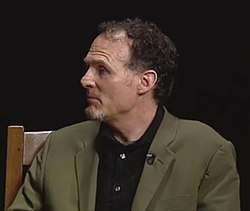Taggart Siegel
Taggart Siegel is an American documentary filmmaker. For 30 years, he has produced and directed Emmy-nominated, award-winning documentaries and dramas that reflect cultural diversity. He is co-founder of Collective Eye Films, a nonprofit media production and distribution organization.

Films
The Real Dirt on Farmer John (2005) has won 31 international film festival awards,[1] including the 2005 Nashville Film Festival Reel Current Award selected by Al Gore.[2] The film was featured on Independent Lens.[3]
The Disenchanted Forest (1999) follows endangered orphan orangutans on the island of Borneo as they are rehabilitated and returned to their rainforest home. It centres on the three main Borneo Orangutan Survival Foundation (BOS) projects - Wanariset, Nyaru Menteng and Mawas. It is narrated by Brooke Shields.[4]
The Split Horn: Life of a Hmong Shaman in America and Between Two Worlds follow the story of Hmong people adapting to life in America. Both films have aired on Public Broadcasting Corporation. Between Two Worlds was nominated for an Emmy Award in 2004.[5]
Filmography
Documentaries
| Year | Film | Credit |
|---|---|---|
| 2016 | Seed: The Untold Story | Director |
| 2010 | Queen of the Sun | Director/Producer |
| 2005 | The Real Dirt on Farmer John | Director/Producer/DP |
| 2001 | The Split Horn: Life of a Hmong Shaman in America | Director/Producer/DP/Editor |
| 1999 | The Disenchanted Forest | Producer/DP |
| 1990 | Heart Broken In Half | Director/Producer/Editor |
| 1988 | Blue Collar and Buddha | Director/Producer |
| 1986 | Between Two Worlds | Director/Producer/Editor |
| 1984 | Bitter Harvest | Director/Producer/DP/Editor |
Fictional Work
| Year | Film | Credit |
|---|---|---|
| 1998 | The Beloved | Producer |
| 1996 | Destroying Angel | Producer |
| 1995 | Shadow of the Pepper Tree | Director/Producer |
| 1994 | Body Memories | Director/Producer |
| 1989 | Ember Days | Director/Producer/Editor |
| 1983 | Affliction | Director/Producer/DP/Editor |
References
- "Angelic Organics - Awards & Honors". www.angelicorganics.com. Retrieved Dec 23, 2019.
- http://www.nashvillefilmfestival.org/Archives/2005AwardWinners/tabid/126/Default.aspx
- "Independent Lens . THE REAL DIRT ON FARMER JOHN | PBS". www.pbs.org. Retrieved Dec 23, 2019.
- "Welcome To Alchemy Films". Alchemy Films. Retrieved Dec 23, 2019.